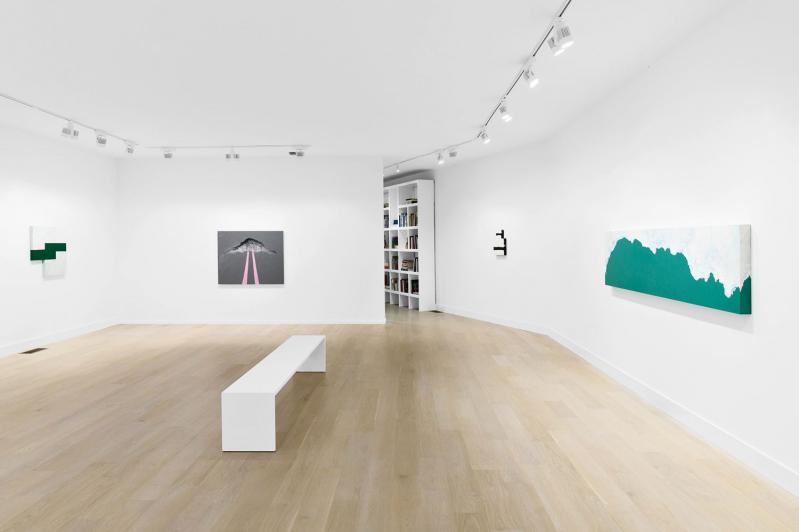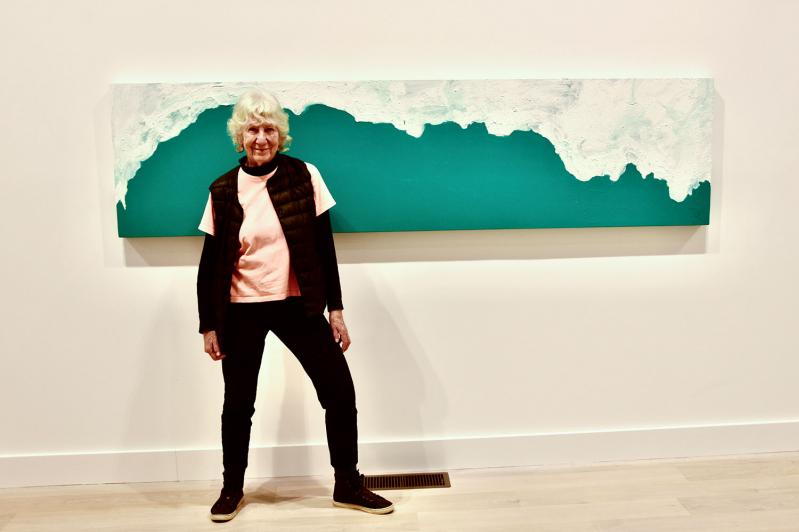Having grown up on the West Coast, in San Francisco and Los Angeles, and spending a good portion of her adult life on the South Fork, Mary Heilmann has long been influenced by the ocean. These days it is affecting her art as well.
A new series that came into being last year but took off in her Bridgehampton studio during this spring's Covid-19 shutdown is currently on view at the Hauser & Wirth gallery in Southampton. The artist sat down there recently to discuss what was on hanging on the walls around her in the exhibition, titled "Highway, Oceans, Daydreams."
The first thing she noted was the universal constancy of her theme. "The one thing that is pan-coastal, all over the world, is the ocean." She has spent a good deal of her adult life sitting at the beach, contemplating its vastness and the power of the ocean's waves on the shoreline and on the people, including herself, who interact with it.
Yet it wasn't until she came upon a new medium, a glaze with acrylic granules in it, that she really took to it as a subject for her art. The glaze and its grit give structure to her abstracted and minimal waves and remind viewers, in a grounding way, of the sandy beach below.
She has tried out the new medium and its possibilities across various supports, working atop small handmade paper sheets, shaped canvas, and large, room-dominating wood panels, each of which gives the paintings a sculptural quality that continues to challenge modernist notions of formalism. "We spent a lot of time figuring out what height to hang them to make you feel like you're in the wave or right in front of it," she said.
Exploring the ocean as a theme has reconnected her to memories of the cold water and foggy beaches of San Francisco, the more accommodating water and sand in Santa Barbara, and the beach culture inherent in each. Although she body-surfed, "I was never a board surfer," she said. "It was biased against girls back then; the boards were fat and heavy. No one would let you borrow one or show you how to do it." This was in the early 1960s, when surf culture was just catching on around the country. "The whole scene was really cool."
As a writing major at the University of California at Santa Barbara, "school was not a priority." But through some miracle, as she describes it, she was given a scholarship at Berkeley to pursue an M.A. in ceramics. She has spent a career moving back and forth from painting to sculpture, including her ceramic works, which were highlighted in a show at Dia Bridgehampton a few years back.

The waves are a connection to the land, the calendar, and to life. "A lot of daydreaming is happening now," she said. Back in the studio, she is "quietly looking at the wall and thinking about the work a lot of the time." The exercise often brings up the past, and she finds herself looking up things and calling friends to see if and how they remember the same incidents.
Ms. Heilmann came of age at a time of great change in the art world, the shift from the overheated emotion of Abstract Expressionism to the cooler styles of Pop and Minimalism. Although she met a lot of artists on the West Coast, such as Bruce Nauman, the center of the art world continued to be in New York. She moved there in the latter part of the 1960s and visited here soon after, invited by Mr. Nauman, who was spending the summer working at Roy Lichtenstein's house in Southampton.
She began coming east regularly in the years that followed, sometimes staying at the Cozy Cabins and eventually taking a rental in the late 1990s to work on a book project. Finding a house and studio then became a priority. She eventually purchased the property she lives on now, with a house in front, a studio at the rear, and a farming parcel next to it that she bought some years back to protect it from development. It's farmed by her neighbors, as it has been for many years. She has credited the field, which she can view from her studio windows, with inspiring her as well. The time she has spent here since March is the longest consecutive period she has stayed in Bridgehampton.
The gallery is dominated by the wave paintings, but they are not the only subjects in the rooms. Sharing space on the walls are older works that allow viewers to compare and contrast similar visual territory or themes. "Idriss," named for a boyfriend she met in Morocco, is an abstract painting from 2012. Although it looks nothing like the wave paintings, the wood grain on the central panel, painted a translucent yellow, has a remarkable similarity to waves.
"Geometric Break," from this year, shares the same palette, but it is not clear at first what else it has in common with its companions. Spend a little time with it (and/or the artist) and it becomes apparent that it is exactly what it says it is, a geometric "break," or abstraction, of a wave. It is superficially hard-edged, but she has let some of the signature teal paint drip down from the lines, lending it an organic and water-like quality that enriches the experience of looking. "Another Green Tube," which is painted on a shaped wood panel, ties back to some of her recent work and demonstrates a kind of artistic "eternal return" also symbolized by the waves.
"Lost Highway, Tule Fog" is less about the East End, even though the fog looks familiar, and instead channels some of the memories of her youth she has been revisiting. These include the cross-country drives she often undertook when she was still new to New York and traveling back west to see friends and family. She said the fog was a desert phenomenon created by cool evening air hitting the sand, which was still hot from the day. "It makes it impossible to see."
Those solitary drives and the social activity of the beach are the kind of dichotomies she is working through now. "I used to see my life in that solitary sort of way, with meditation and working alone." Yet she also feels very connected to friends and a large artistic community through history and culture. "It's a magical way to live life," she said.




